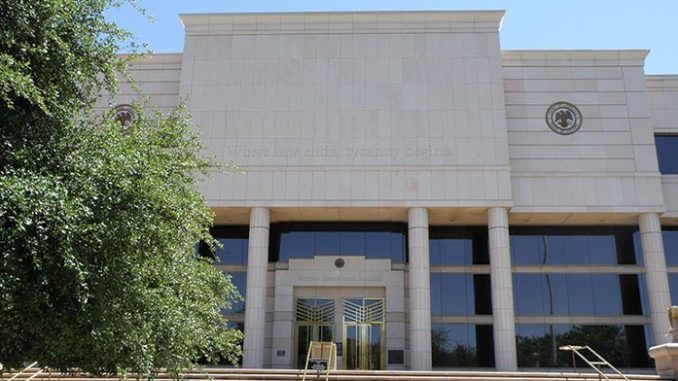
A judge will conduct a hearing Tuesday in a case the Arizona Supreme Court recently ordered reopened 31 months after she ruled a Sierra Vista man did not have legal standing to complain about the fact the Cochise County Board of Supervisors filled a high-paying judicial position with one of their own in 2019.
Judge Monica Stauffer will conduct the Nov. 16 status conference with the attorneys for David Welch and for Cochise County. Welch alleges Arizona’s open meeting and conflict of interest laws were violated in the February 2019 appointment of then-Supervisor Pat Call to serve as justice of the peace of the Sierra Vista Justice Court.
Stauffer, who is Greenlee County’s presiding judge, has presided over the case from the beginning due to conflicts with having a Cochise County judge hear the matter.
Last month the Arizona Supreme Court sent the case back to Stauffer after the justices unanimously ruled Welch had the right as a resident within the jurisdiction of the Sierra Vista Justice Court to bring his lawsuit. Whether the supervisors -Peggy Judd, Ann English, and Call- violated any laws is yet to be determined because Stauffer dismissed Welch’s lawsuit shortly after it was filed due to a lack of standing.
Court records show Welch sued days after English and Judd voted Call into the position in February 2019 without any advance public notice. In his lawsuit, Welch asked for Call’s appointment to be voided and that all three supervisors be penalized for violating state laws.
Stauffer ruled at the time that Welch lived within the boundaries of the Sierra Vista Justice Court and was being prosecuted in that court on a misdemeanor charge. However, neither fact gave him standing to legally challenge Call’s appointment nor how it was handled, she ruled.
It would take until October 2020 for the Arizona Court of Appeals to reject several of the legal conclusions Stauffer relied on in dismissing Welch’s lawsuit for a lack of standing. The appellate opinion ordered Stauffer to issue a new order based on their conclusion that Welch had standing as a taxpayer.
Cochise County then petitioned to the Arizona Supreme Court, effectively putting Welch’s case on hold for nearly one year. On Sept. 2, the justices ordered Welch did have standing to pursue his lawsuit, although they rejected that taxpayer status was necessary.
Instead, the Supreme Court ruled that state law gives broad standing to citizens to challenge alleged violations of the open meeting and the conflict of interest laws.
“As one such person and, more specifically, as one of the Board’s constituents, Welch has an interest in ensuring that the Board’s ‘official deliberations and proceedings be conducted openly,” Chief Justice Robert Brutinel wrote.
And as to Welch’s allegation that Arizona’s conflict of interest law was violated when Call involved himself in the appointment process, Brutinel wrote that as someone with litigation pending in the Sierra Vista Justice Court at the time, “Welch had a particular interest in ensuring the justice of the peace presiding over his claims was not selected through self-dealing.”
The official mandate of the supreme court opinion was finally issued Oct. 20 once the time expired for Cochise County officials to request a reconsideration. The opinion commands Stauffer to hold “such proceedings” as necessary to comply with the justices’ findings.
The scheduling conference set for Nov. 16 is the first step in complying with that order, although it is unclear whether Stauffer will request supplement arguments from the parties or if simply issue a new ruling based on the record before the court back in April 2019. Any new ruling she makes could prompt another appeal.
The heart of Welch’s case stems from the hours shortly before Call was voted in as justice of the peace, as position which does not require a law degree despite the fact nearly 85 percent of all felony cases start in a justice court.
Several local attorneys attended the February 2019 board meeting intent on expressing their interest in the position. Instead, Call advocated during the meeting to fill the vacancy without seeking letters of interest or utilizing a review committee.
A few hours later, English and Judd voted Call -who is not an attorney- into the position which doubled his government salary. The appointment came shortly after a non-public executive session and without any opportunity for public comment.
The misdemeanor charge was dismissed against Welch at the request of the Cochise County Attorney’s Office on March 1, 2019, the same day Call took the bench. Call did not run for election in November 2020.

